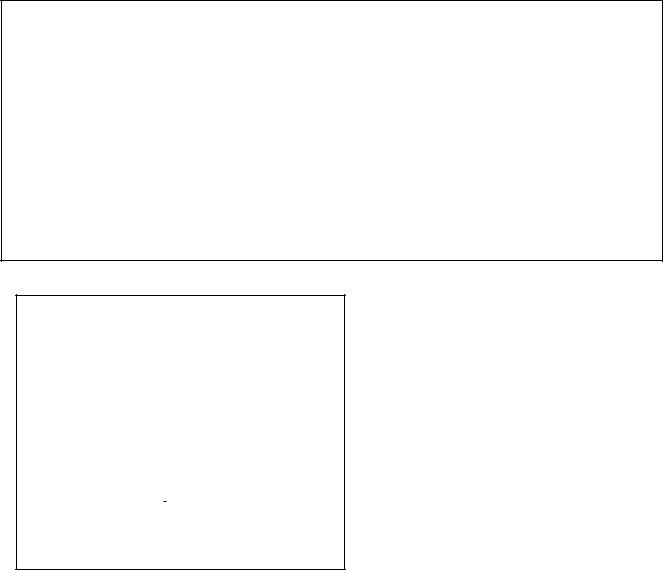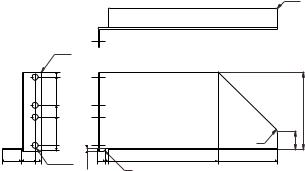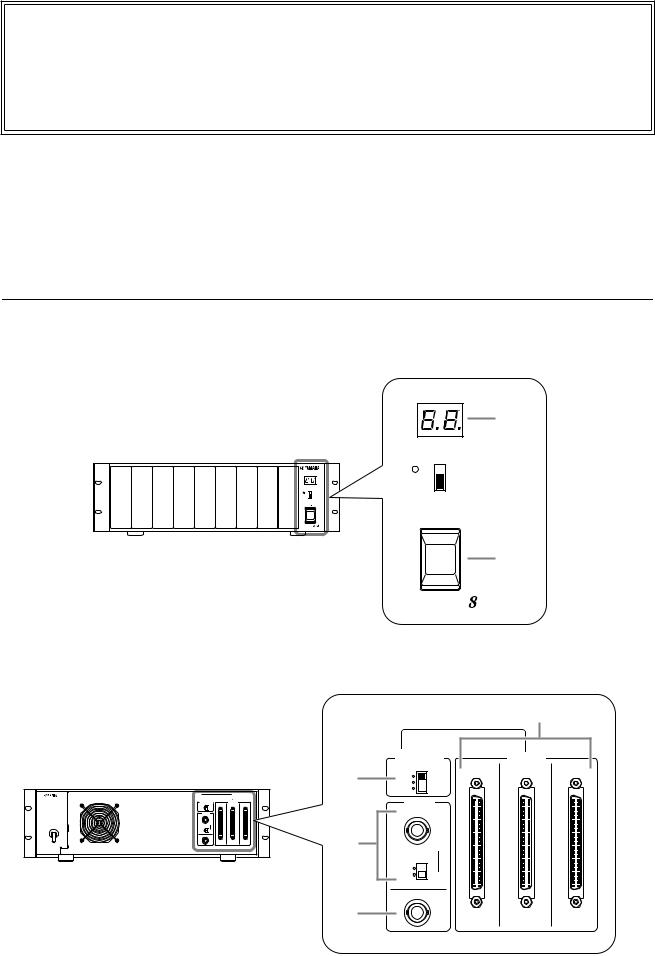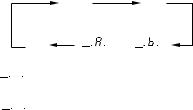Yamaha AI8-ML8, AI8, AI8-ML4AD4, AI8-AD8 User Manual

ANALOG INPUT BOX 

ANALOG INPUT UNIT
ANALOG INPUT UNIT
ANALOG INPUT UNIT


 -ML8
-ML8


 -AD8
-AD8


 -ML4AD4
-ML4AD4
Owner’s Manual
V509990 R1 1 IP 16
E
1000 CP Printed in Japan

FCC INFORMATION (U.S.A.)
1.IMPORTANT NOTICE: DO NOT MODIFY THIS UNIT! This product, when installed as indicated in the instructions contained in this manual, meets FCC requirements. Modifications not expressly approved by Yamaha may void your authority, granted by the FCC, to use the product.
2.IMPORTANT: When connecting this product to accessories and/or another product use only high quality shielded cables. Cable/s supplied with this product MUST be used. Follow all installation instructions. Failure to follow instructions could void your FCC authorization to use this product in the USA.
3.NOTE: This product has been tested and found to comply with the requirements listed in FCC Regulations, Part 15 for Class “B” digital devices. Compliance with these requirements provides a reasonable level of assurance that your use of this product in a residential environment will not result in harmful interference with other electronic devices. This equipment generates/uses radio frequencies and, if not installed and used according to the instructions found in the users manual, may cause interference harmful to the operation of other electronic devices. Compliance with FCC regulations does not guarantee that interference will not occur in all installations. If this product is found to be the source of interference, which can be determined by turning the unit “OFF” and “ON”, please try to eliminate the problem by using one of the following measures: Relocate either this product or the device that is being affected by the interference. Utilize power outlets that are on different branch (circuit breaker or fuse) circuits or install AC line filter/s. In the case of radio or TV interference, relocate/reorient the antenna. If the antenna lead-in is 300 ohm ribbon lead, change the lead-in to coaxial type cable. If these corrective measures do not produce satisfactory results, please contact the local retailer authorized to distribute this type of product. If you can not locate the appropriate retailer, please contact Yamaha Corporation of America, Electronic Service Division, 6600 Orangethorpe Ave, Buena Park, CA 90620
The above statements apply ONLY to those products distributed by Yamaha Corporation of America or its subsidiaries.
WARNING: THIS APPARATUS MUST BE EARTHED
IMPORTANT
THE WIRES IN THIS MAINS LEAD ARE COLOURED IN
ACCORDANCE WITH THE FOLLOWING CODE:
GREEN-AND-YELLOW : EARTH
BLUE : NEUTRAL
BROWN : LIVE
As the colours of the wires in the mains lead of this apparatus may not correspond with the coloured markings identifying the terminals in your plug, proceed as follows:
The wire which is coloured GREEN and YELLOW must be connected to the terminal in the plug which is marked by the letter E or by the safety earth symbol  or coloured GREEN and YELLOW.
or coloured GREEN and YELLOW.
The wire which is coloured BLUE must be connected to the terminal which is marked with the letter N or coloured BLACK.
The wire which is coloured BROWN must be connected to the terminal which is marked with the letter L or coloured RED.
*This applies only to products distributed by YAMAHA KEMBLE MUSIC (U.K.) LTD.
2

■ Precautions
•Do not place a container with liquid or small metal objects on top of this unit. Liquid or metal objects inside this unit are a fire and electrical shock hazard.
•Do not allow water to enter this unit or allow the unit to become wet. Fire or electrical shock may result.
•Connect this unit’s power cord only to an AC outlet of the type stated in this Owner’s Manual or as marked on the unit. Failure to do so is a fire and electrical shock hazard.
•Do not scratch, bend, twist, pull, or heat the power cord. A damaged power cord is a fire and electrical shock hazard.
•Do not place heavy objects, including this unit, on top of the power cord. A damaged power cord is a fire and electrical shock hazard. In particular, be careful not to place heavy objects on a power cord covered by a carpet.
•If you notice any abnormality, such as smoke, odor, or noise, or if a foreign object or liquid gets inside the unit, turn it off immediately. Remove the power cord from the AC outlet. Consult your dealer for repair. Using the unit in this condition is a fire and electrical shock hazard.
•Should this unit/AC adapter/power supply be dropped or the cabinet be damaged, turn the power switch off, remove the power plug from the AC outlet, and contact your dealer. If you continue using the unit without heeding this instruction, fire or electrical shock may result.
•If the power cord is damaged (i.e., cut or a bare wire is exposed), ask your dealer for a replacement. Using the unit with a damaged power cord is a fire and electrical shock hazard.
•Do not remove the unit’s cover. You could receive an electrical shock. If you think internal inspection, maintenance, or repair is necessary, contact your dealer.
•Do not modify the unit. Doing so is a fire and electrical shock hazard.
•When rack-mounting the unit, allow enough free space around the unit for normal ventilation. This should be: 10 cm at the sides, 15 cm behind, and 30 cm above.
•For normal ventilation during use, remove the rear of the rack or open a ventilation hole.
•If the airflow is not adequate, the unit will heat up inside and may cause a fire.
•This unit has ventilation holes at the top, bottom, and rear to prevent the internal temperature rising too high. Do not block them. Blocked ventilation holes are a fire hazard.
•Hold the power cord plug when disconnecting it from an AC outlet. Never pull the cord. A damaged power cord is a potential fire and electrical shock hazard.
•Do not touch the power plug with wet hands. Doing so is a potential electrical shock hazard.
•The digital circuits of this unit may induce a slight noise into nearby radios and TVs. If noise occurs, relocate the affected equipment.
•XLR-type connectors are wired as follows: pin 1: ground, pin 2: hot (+), and pin 3: cold (–).
Rack Mounting Caution
If the unit is rack mounted and transported regularly, for example, when on a tour, we recommend that the rear of the unit be supported by fitting a pair metal brackets, one each side. The following drawing provides the information necessary to make such brackets.
Note that only one bracket is shown here and the bracket for the other side must be bent in the opposite direction.
2-R2
|
|
|
|
2-R2 |
|
|
|
|
|
|
|
|
|
(82.1) |
|
|
|
|
|
|
|
|
|
76.2 |
|
|
|
|
|
|
|
|
|
44.45 |
|
|
|
|
|
|
|
|
|
31.75 |
|
|
|
|
|
|
|
|
|
0 |
|
|
|
|
|
36.5 |
14.5 |
0 |
7.5 |
5.9 |
3.1 |
0 8 |
12 |
|
|
4- ø6.5 |
R2 |
||||||||
|
|
|
|
|
|
|
|||
t = 1.6 |
|
|
|
|
|
|
|
||
|
|
86.5 |
|
R5 |
20.5 |
|
|
|
134 |
|
200 |
3

Thank you for choosing the AI8 analog input box, or the AI8-ML8/AI8-AD8/AI8-ML4AD4 analog input unit, specifically designed for the Yamaha PM1D digital audio mixing system.
The AI8 inputs signals to the DSP unit DSP1D/DSP1D-EX engine (controlled via the CS1D control surface). Up to ten AI8s can be connected to each DSP1D/DSP1D-EX.
Be sure to ask an authorized Yamaha service engineer to install the card and set up the unit. Never perform installation and setup by yourself.
Cards installable on the AI8 analog input box:
•LMY2-ML : MIC/LINE input card
•LMY4-AD : AD card
Up to eight cards can be installed.
Analog input unit models:
• AI-8-ML8 : AI8 analog input box that has eight LMY2-ML cards installed
• AI8-AD8 : AI8 analog input box that has eight LMY4-AD cards installed
• AI8-ML4AD4 :AI8 analog input box that has four LMY2-ML cards and four LMY4-AD cards installed
■ Front panel
1 |
2 |
3 |
4 |
5 |
6 |
7 |
8 |
UNIT NO.
PHANTOM MASTER
ON
+48V
OFF
POWER
ON/ OFF
*The illustration shows the AI8 analog input box.
INPUT UNIT ID
1
PHANTOM MASTER
ON
+48V  2
2
OFF
POWER
 ON/
ON/  OFF
OFF
3
ANALOG INPUT BOX
■ Rear panel
CONTROL |
OUTPUT |
|
|
PORT |
|
|
|
A |
C |
B |
A |
B |
|||
C |
|
|
|
WORD |
|
|
|
CLOCK |
|
|
|
|
IN |
|
|
OFF |
75Ω |
|
|
ON |
|
|
|
|
OUT |
|
|
|
|
|
5 |
|
|
CONTROL |
|
OUTPUT |
|
|
PORT |
|
|
|
4 |
A |
C |
B |
A |
B |
||||
|
C |
|
|
|
WORD |
|
CLOCK |
|
6 |
IN |
OFF |
75Ω |
ON |
|
7
OUT
4

A INPUT UNIT ID indicator
This indicator displays the ID number of the INPUT connector of the DSP unit DSP1D/DSP1D-EX connected to the AI8. If an error occurs in the connection to the DSP1D, or if the unit does not lock to the wordclock signal, one of the following error indications appears.
Error message
E1: The AI8 is connected to the OUTPUT connector of the DSP1D/DSP1D-EX. Connect the AI8 to the INPUT connector.
E3: A cable is disconnected from the OUTPUT A, B, or C connector on the rear panel, or the connection is made incorrectly. If the connection is proper, replace the cable.
UL: The unit does not lock to the wordclock signal.
UC: The control signal is not being received correctly.
“.x .”:(two dots and the ID number of the OUTPUT connector on the DSP1D/DSP1D-EX) Illuminating or flashing dots mean that the AI8 is connected in Mirror mode from the DSP1D/ DSP1D-EX.
If “.x .” lights up continuously during Mirror mode operation, the CONTROL PORT switch (4) setting matches the setting controlled from the CS1D and the system is operating normally. If the control signal from the CS1D has changed the setting during Mirror mode operation and it does not match the CONTROL INPUT PORT switch (4) setting any more, this indicator changes in the following order.
|
“.x.” |
|
“. .” |
“. .” |
“ |
”(or “ |
”) |
“ ” means that the control signal from the CS1D has changed the setting to “A.”
” means that the control signal from the CS1D has changed the setting to “A.”
“ ” means that the control signal from the CS1D has changed the setting to “B.”
” means that the control signal from the CS1D has changed the setting to “B.”
During this time period, you can connect or disconnect the cable from the unselected output connector.
If you set the CONTROL PORT switch so that it
matches the setting made via the control signal from the CS1D, “.x .” lights up continuously.
B PHANTOM MASTER switch, indicator
This switch is used to turn the phantom power on and off to all the headphone amplifiers of the input connectors (for which the phantom power is switched on) on the AI8 that has the LMY2-ML analog input card equipped with the headphone amplifier. When you turn on the switch, the indicator on the left of the switch lights up.
C POWER ON/OFF
Use this switch to turn the power to the AI8 on and off. When the power is turned on, the INPUT UNIT ID indicator lights up.
D CONTROL PORT switch
This switch enables you to select a port used to control the AI8 via the DSP unit DSP1D/DSP1D-EX. Select from OUTPUT A, B, and C to receive the control signal for switching between channels A and B on the LMY2-ML analog input card, or turning the phantom power on and off.
During Mirror mode operation, the control signal sent from the CS1D has priority, and the CONTROL PORT switch is disabled. In this case, the INPUT UNIT ID indicator shows the status. For more information, refer to 1 INPUT UNIT ID indicator.
E OUTPUT connectors A, B, C
These connectors are used to output multi-channel digital audio signals. The same signal is routed to all three connectors. Be sure to use the included genuine Yamaha half-pitch 68-pin cable for connection. Optional genuine Yamaha cables in a variety of lengths are also available.
F WORD CLOCK IN jack, ON/OFF switch
The WORD CLOCK IN jack is used to provide the word clock to the AI8 from a connected external device or a clock generator. Use a BNC cable with an impedance of 75 Ω for connection.
The WORD CLOCK ON/OFF switch is used to terminate the word clock connection. Basically, if the AI8 is the last device of the word clock chain, or if nothing is connected to the WORD CLOCK IN/OUT jacks, set this switch to ON.
G WORD CLOCK OUT jack
The WORD CLOCK OUT jack is used to provide word clock from the AI8 to the connected external device, such as a clock generator, digital MTR, and DAT recorder. Use a BNC cable with an impedance of 75 Ω for connection.
5
